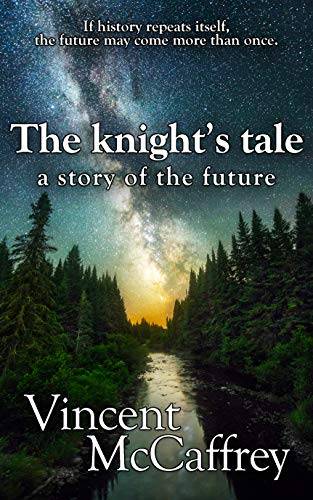

The knight's tale, a story of the future
by Vincent McCaffrey
For 21 days of the year 2162, John Holt, an aging paladin in the now dwindling Order of Pelagius, attempts to keep his honor, fulfill his duty, and resolve past mistakes, as he confronts his future.
Called upon by a local sheriff (and former knight) to solve the mundane murder of a cattleman, he is beguiled by the love of a good woman, finds himself entangled in the breaking of a local slave trade, snared by the correcting of a wrongful death he may have caused, and obligated to investigate another.
Unknowingly at first, he must confront a power working to dominate the nations of Earth and the independent states of the heliosphere, even as a previously vanquished foe seeks revenge—by plan and accident, using railguns, railroads, dirigibles, steam trucks, river barges, and the help of a horse named Rosie.
Three generations after the end of the famines and plagues that were the end of history now known as 'The Elide,' when the Long Wars are little more than legend, a depopulated world has renewed itself again.
The earth's abandoned colonies in the heliosphere are flourishing and independent, while the 'remnant' peoples of the earth have reorganized under weakened governments without armies.
Trade between the outer nations and the earth has increased steadily as fears of lingering viruses fade and the demand by the former settlements for the earth's natural resources and raw materials like wood, fertile soil, and specific minerals, continues to grow.
Subtly, but profoundly, humanity has divided into two parts: those who live on the earth, and those who live in the settlements of the heliosphere whose ancestors left Earth before the plagues and thus have little resistance to those viruses. This physical difference will remake the future, as most of mankind will never return to the Earth.
In lore, some called them the Fifth Horsemen—the ones who slay the other four. During the generational terrors of pestilence, famine, and war, it was the knight who held the thin line of civilization and offered esperance to the survivors. Yet, in fact, it was something even more grand. It was ordinary men, ordered to kneel, who chose to stand.
Called upon by a local sheriff (and former knight) to solve the mundane murder of a cattleman, he is beguiled by the love of a good woman, finds himself entangled in the breaking of a local slave trade, snared by the correcting of a wrongful death he may have caused, and obligated to investigate another.
Unknowingly at first, he must confront a power working to dominate the nations of Earth and the independent states of the heliosphere, even as a previously vanquished foe seeks revenge—by plan and accident, using railguns, railroads, dirigibles, steam trucks, river barges, and the help of a horse named Rosie.
Three generations after the end of the famines and plagues that were the end of history now known as 'The Elide,' when the Long Wars are little more than legend, a depopulated world has renewed itself again.
The earth's abandoned colonies in the heliosphere are flourishing and independent, while the 'remnant' peoples of the earth have reorganized under weakened governments without armies.
Trade between the outer nations and the earth has increased steadily as fears of lingering viruses fade and the demand by the former settlements for the earth's natural resources and raw materials like wood, fertile soil, and specific minerals, continues to grow.
Subtly, but profoundly, humanity has divided into two parts: those who live on the earth, and those who live in the settlements of the heliosphere whose ancestors left Earth before the plagues and thus have little resistance to those viruses. This physical difference will remake the future, as most of mankind will never return to the Earth.
In lore, some called them the Fifth Horsemen—the ones who slay the other four. During the generational terrors of pestilence, famine, and war, it was the knight who held the thin line of civilization and offered esperance to the survivors. Yet, in fact, it was something even more grand. It was ordinary men, ordered to kneel, who chose to stand.

